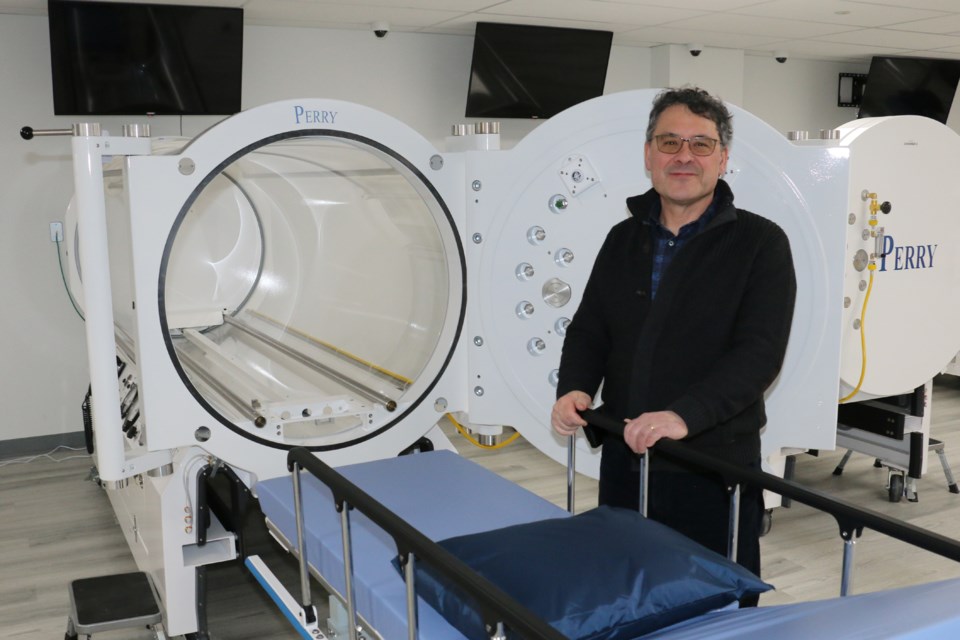A new medical clinic has opened in Sudbury to provide specialized treatment to people who have longstanding wound damage that hasn't healed.
The clinic, called Sudbury Hyperbarics and Wound Care, is located at 2009 Long Lake Rd. in the medical building located in the Shoppers Drug Mark plaza at the Four Corners. It is the first of its kind in Sudbury and the first anywhere in Northern Ontario, said Sudbury physician Dr. Raymond Jacques, the medical director at the clinic.
What makes the treatment specialized is that patients are required to be sealed into a large hyperbaric chamber. Pure oxygen is then fed in to envelop the body with oxygen, under pressure, to speed the healing process.
Some people might be familiar with hyperbaric chambers from movie scenes where deep sea divers are placed in a large cylinder to recover if they suffer from decompression sickness.
Jacques said the hyperbaric oxygen therapy (HBOT) goes beyond that to provide healing of pressurized oxygen to a variety of medical conditions.
"Because when you have a wound, it's probably because you have hypoxia," said Jacques.
"With bad arteries you have hypoxia. So you can't generate enough tissue cellular growth to go there and heal. So if we bring in high-pressure oxygen, we create enough oxygen around the wound that it stimulates the growth of new (blood) vessels.”
Jacques said the oxygen also kills some bacteria, helps reduce infections and promotes quicker healing.
He said there are many patients who suffer from wounds that fail to heal properly. For example, this would include some patients with wounds resulting from diabetic conditions and a host of other medical conditions that do not respond to conventional treatments.
He added that OHIP, Ontario's health insurance plan, covers almost all HBOT treatments.
The clinic's website outlines how OHIP works for the oxygen therapy and what medical conditions are covered.
Not all medical conditions are covered by OHIP though, Jacques said. He gave the example of a concussion that a person might suffer on the sports field or in a car accident. In cases like that, Jacques said patients would have to rely on insurance to cover the cost. He added that there is hope that OHIP will come through eventually to cover concussion treatments.
While some might criticize the idea of a privately-owned clinic charging for a medical treatment, Jacques said hyperbaric therapy is something that is not being provided by Northern Ontario hospitals.
He said the hope is that OHIP will come around to eventually providing coverage for concussion treatments, given that concussions are serious medical situations.
Jacques said the idea of hyperbaric therapy is not new by any means. Use of the therapy began about a century ago, according to information provided by Johns Hopkins.
Hyperbaric therapy is more common in larger cities where there is a larger population that can support the significant cost of setting up a clinic. He did not comment on the cost of the Sudbury clinic, but said there was a local team of physicians and a couple of health-care professionals from southern Ontario who formed an investment group.
A medical supply website said the cost of hyperbaric treatment units were roughly CDN $55,000 each.
Jacques said hyperbaric oxygen clinics are also common in large U.S. cities, especially those that have professional sports teams where athletes suffer injuries.
He said sports organizations are fully aware of the importance of using hyperbaric therapy for athletes.
"So the athletes use this for concussions. They don't wait till they're sick. You get a concussion, they take care of them," said Jacques.
He added that the healing process takes time, up to 40 days at two hours per session, but he said it is effective. Patients need a referral from their own physician, or they can attend a walk-in clinic or contact Bayshore Health, which he said has a wound care program in Sudbury. .
Jacques said patients also need to follow a strict regimen of preparing for their first visit because of the presence of oxygen in the hyperbaric chamber.
He said neither laptops nor cellphones are allowed in the chamber because electronic devices can generate a spark. He said the patients also wear cotton hospital pyjamas, as other types clothing could cause a static electricity spark.
Len Gillis covers health care for Sudbury.com.
